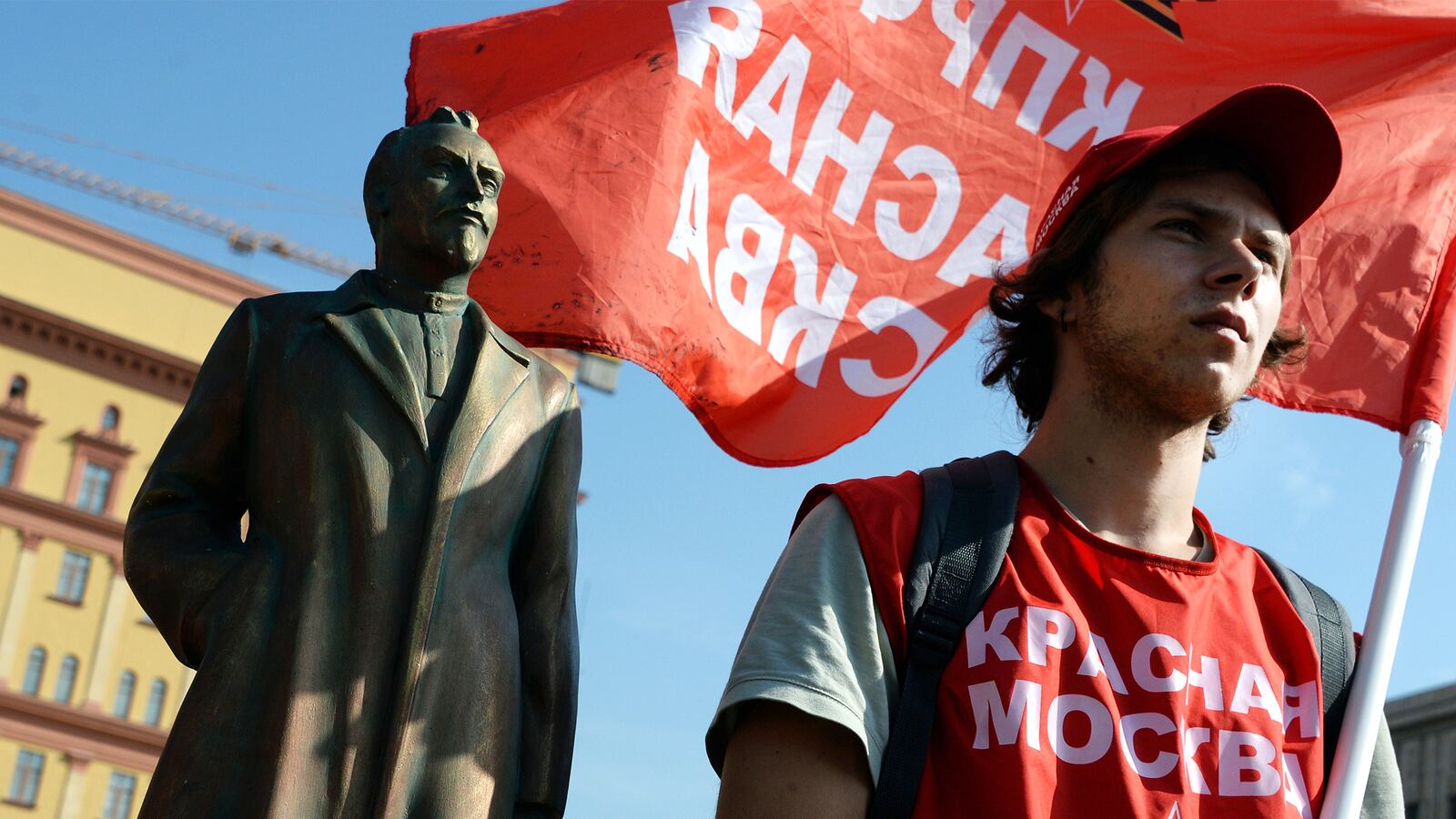When the controversy over Confederate flags and monuments first flared last month, I came across a tweet by conservative activist Dan Gainor declaring, “If you vandalize statues and flags you don’t like, you are a thug.” I couldn’t resist responding with a photo of the historic 1991 takedown of “Iron Felix,” the Soviet secret police founder Felix Dzerzhinsky, in Moscow, and asking if the label would still fit. In the back-and-forth that ensued, Gainor finally suggested that I had no business commenting on the issue because I wasn’t born in the United States.
Aside from the obvious whiff of nativist bigotry, I found the gibe ironic: just then, I was thinking that my Russian/Soviet background (my family left the USSR in 1980 when I was sixteen) had turned out to be unexpectedly relevant to my perspective on America’s Confederate legacy. The debate over this issue has some surprising parallels to the last quarter century’s battles over history and memory in post-Soviet Russia.
Some critics of Confederate flag removal have invoked Soviet parallels, too, but in a very different way. Last month, South Carolina legislator Lee Bright—who happens to be the state co-chair for the presidential campaign of Sen. Ted Cruz—likened calls to take down the flag from the state’s Capitol building to a “Stalinist purge.” On a similar note, in a USA Today column titled “Confederate culture war going Soviet,” Naval Academy Museum director Claude Berube invokes the fate of 1930s Soviet commissar Nikolai Yezhov who carried out Stalin’s reign of terror only to be purged and executed himself—and to be cropped out of an official photo in which he stood next to Stalin. Deploring calls to remove statues of Confederate leaders and change the names of U.S. Army forts named after Confederate generals, Berube concludes, “Real education of the past cannot occur when part of that past is destroyed or purged.”
Meanwhile, in today’s Russia, it’s pro-Soviet opinion—which, these days, is almost identical to the official Kremlin stance—that deplores the “purging” of history. Thus, an article on Sputnik News, an international news service run by the Russian government, assails the “‘jihad’ on of Lenin monuments” in the new Ukraine as not only vandalism but an attempt at “erasing the Soviet period from Ukraine’s history.” (Over here, conservative columnist Tammy Bruce strikes a not-too-dissimilar chord when she accuses liberals of “wanting to erase Southern history from the public square.”)
Just a few days ago, the Russian media reported that a Stalin-focused World War II museum, complete with a bust of the dictator, had opened in a village near the city of Rzhev, in a house where Stalin stayed overnight during a trip near the frontlines in August 1943. Culture minister Vladimir Medinsky defended the move in an Izvestia interview by saying that “Stalin’s place is in history and historical memory… Everything together, with nothing removed—that is our history.”
Of course, such pleas for historical completeness tend to be selective. Proponents of the Jefferson Davis Highway show little interest in commemorating slavery; proponents of the Stalin museum show no enthusiasm for commemorating the Gulag.
Is the comparison fair? Some American conservatives will no doubt take umbrage at the suggestion that any period of U.S. history can be viewed as morally equivalent to the Soviet Union; conversely, some leftists will probably balk at the notion that the communist experiment, for all its awful failings, was on a par with slavery. (Incidentally, it is worth noting that while Southern pro-slavery propaganda sometimes branded abolitionists as “socialists” and “Communists,” slavery apologists could rail against capitalism and bourgeois individualism in ways that would do Lenin proud. Prominent Southern intellectual George Fitzhugh even asserted in a 1854 essay that “slavery is a form, and the very best form, of socialism.”)
A few commentators and historians have referred to the Confederacy as a quasi-totalitarian and even proto-Stalinist state—which may or may not be accurate in terms of political theory. But it was unquestionably a regime created to preserve and defend slavery, an institution under which, at the start of the Civil War, nearly four million people were denied basic human rights. If that doesn’t qualify for evil empire status, I don’t know what does.
Interestingly, some Russian authors have picked up on the parallel—on both sides of the history wars. In her last article published before her death last year, the fiery dissident Valeria Novodvorskaya gloomily predicted that Ukraine was headed for a “bad peace” in which the pro-Russian separatists would accept defeat but keep enough clout to elect their leaders to regional offices and the national parliament, stymie the country’s progress, and maintain control over local schools. As an example of such “bad peace,” Novodvorskaya cited the outcome of America’s Civil War in which “the North plundered the South with taxes” while Southerners “organized the Ku Klux Klan, murdered blacks who tried to vote, and regarded themselves as an occupied country.”
Only a few month earlier, in March 2014, Komsomolskaya Pravda’s ultranationalist columnist Ulyana Skoibeda (notorious for a 2013 column voicing regret that “the Nazis didn’t make lampshades out of the forefathers of today’s [Jewish] liberals”), had invoked the “occupied” South in a very different spirit. Her column on the annexation of Crimea opened with a recollection of being deeply struck, as a child, by one particular line from a biography of Gone with the Wind author Margaret Mitchell. The passage explained that Mitchell, raised in Georgia on stories of old times, had “arrived at the strange belief that she lived in a conquered country.” The line, Skoibeda wrote, turned out to be prophetic: years later, it came back to her when she and her husband were trying to explain the collapse of the USSR and the post-Soviet years to their young son. Then, “everything fell into place,” and she had the same epiphany. (Skoibeda also felt that the return of Crimea signaled the return of the USSR: her column was titled, “I No Longer Live in a Conquered Country.”)
For all the differences between Soviet nostalgia in Russia and Confederate nostalgia in the U.S., there are definite similarities. In both cases, the impulse to defend the past is based to a large extent on very human and benign emotion: attachment to the world of one’s childhood, loyalty to one’s parents or ancestors and unwillingness to see their values and principles condemned as deeply wrong or downright evil. In both cases, there is an effort to rewrite the past to make it more palatable. Slavery may have been wrong, the argument goes, but the Confederacy was about states’ rights, and the people who fought on its side were patriots defending their homes. The purges and the Gulag may have been terrible, the argument goes, but Stalin is respected because he steered Russia to industrial progress and victory over Germany.
In both cases, it’s entirely possible—in fact, it’s essential—to preserve and acknowledge history’s uglier pages without celebrating them. As Max Boot—no leftist he—wrote on the Commentary blog about initiatives to remove the Confederate flag from public grounds and change names of public places that honor Confederate leaders, “This is not ‘rewriting’ history; it’s getting history right.”
Of course we should avoid absurd extremes—like removing Civil War-based videogames that feature the Confederate flag from online stores, or dropping merchandise with Confederate symbols from websites that still sell items with Soviet or even Nazi imagery, or calling for a purge of Gone with the Wind. Of course we should recognize that many good, brave, honorable Americans fought for the Confederacy—just like many good, brave, honorable Russians fought for Communism. But it’s possible to honor the people while affirming that the cause has been rightly dispatched to the proverbial ash heap of history.
For years, I have heard pro-freedom Russians argue that Russia has no hope of a better future until it has fully confronted and condemned the crimes of the Soviet past. America has come an incomparably longer way in confronting and condemning the crimes of slavery and segregation that, from the start, tarnished our gains in advancing human liberty. And yet the controversies of the past few weeks have made me fully grasp, in a way I hadn’t before, that Russia’s memory problem has some parallels here. (One difference is that we have unfinished business, while Russia has all but unstarted business.) Too much of our discourse seems polarized between a cultural right that downplays the history of racial oppression, and a cultural left that encourages wallowing in white guilt. Perhaps a sane consensus on the Confederate legacy is the start of a way out of this impasse.
Right now, even as Confederate flags come down in America and Memphis, Tennessee takes steps toward removing Forrest’s grave and statue from a historic public park, the Moscow City Council has approved a referendum on restoring the monument to Dzerzhinsky, who probably presided over the murder of at least 200,000 people in 1917-1923, to its place on Lubyanka square in downtown Moscow. Communist parliament member Valery Rashkin told the independent website Gazeta.ru that “Iron Felix” was a symbol of “honor, decency, and the fight against corruption.”
We’re going, by far, in the better direction.






